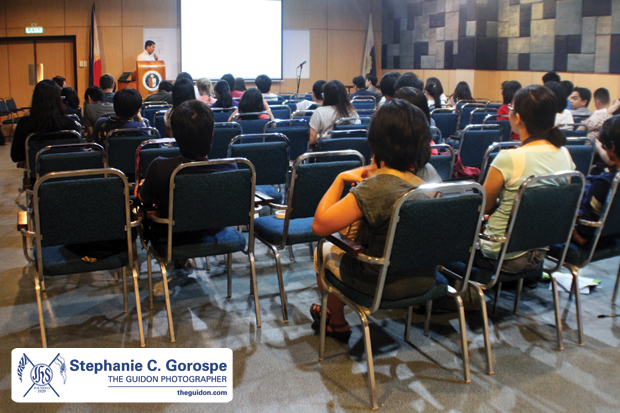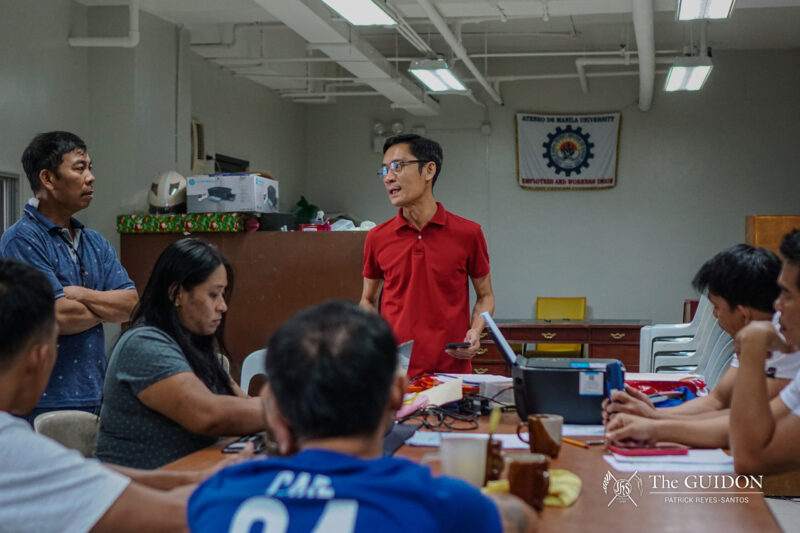
ISSUE ANALYSIS. The AEA forum invited speakers to talk about the economic and health implications of the Sin Tax bill. Photo by Stephanie C. Gorospe.
THE ATENEO Economics Association (AEA) held its first Kamalaean forum this year, entitled “Sin Tax Error?” last August 17 at the Faura AVR.
The talk expounded on the importance of pushing for the revision of Republic Act No. 9334, or the Sin Tax Law, which will increase the excise tax rates imposed on alcohol and tobacco products.
The speakers for the event were Anton Ragos, a consultant at Action for Economic Reforms, and pulmonologist Dr. Maricar Limpin, president of the Philippine Foundation for Lung Health, Research and Development and executive director of the Framework Convention on Tobacco Control Alliance in the Philippines.
Ragos talked about the effects of the Sin Tax bill as a tax law on the Philippine economy, while Limpin explained its health impact.
In his talk, Ragos mentioned that a lot of people from the tobacco industry claimed that if the bill were passed, it would result in an increase of smuggling in the country.
He countered this by saying that, except for a few cases, countries that significantly increased tobacco taxes and prices experienced reduced tobacco consumption and had little or no perceived change in smuggling.
Ragos said that cigarette smuggling is a result of weak governance and poor law enforcement.
AEA Vice President Victorino Floro IV said, “We felt that, with the Sin Tax bill currently being debated on in the Senate [and] having been passed in the lower house, it was imperative that Ateneans should at least know of the bill’s existence and, further, the effects of the bill.”
Kamalaean is a series of talks that aim to shed light on certain economic issues.
Health and economic benefits
“The present Sin Tax is more than 10 years outdated. The Sin Tax bill proposed by the Department of Finance is not a penalty per se but only a catching up of something, [given] that the laws are behind,” said Economics Department Chair Luis Dumlao, PhD.
Economics sophomore James Clifford Santos said that the forum had helped in the students’ understanding of the nature of the bill as well as its implications on the economy and health of the public.
“Even before the talk, I am for the Sin Tax bill since it has favorable manifest and latent implications on the health of the public sector and on the macroeconomic fundamentals of the country,” he said.
“It has the potential to curb the consumption of sin products, thereby reducing the losses brought about by the proliferation of lifestyle diseases. In addition, the Sin Tax bill can also benefit the credit rating of our economy since it can increase government revenues.”
Limpin said, “From the revenue that we will get from the excise tax, what we would like to do is [for] this revenue to finance the universal health care programs of the Department of Health.”
She further said that, more than just the revenue objectives of the Sin Tax bill, they would also like to achieve the health objectives being advocated by the Philippines’ health sector.
“This is actually one of the things that we would like to emphasize especially in the senate deliberations, because more often than not, what we are hearing from the senators is that they always just think of what is fair to the tobacco and alcohol [industries],” she said. “They always look at [how] these industries are giving us revenues.”
Limpin said that they are pushing for Senate Bill No. 3249, which was authored by Senator Miriam Defensor-Santiago.
Point of the forum
“I learned through the forum] that the Sin Tax Law actually existed…a new one is being put in place, and how ineffective our old one is. The point [of this forum] is public awareness and we’re definitely more aware now,” said Erika Mei Laudencia, a development studies major.
Santos noted, “The Kamalaean forum strengthened my favorable stand towards the passage of the Sin Tax bill. I also gained knowledge about how these measures could be fine-tuned so that they could be made more responsive to the changes that the economy has experienced over time.”
Meanwhile, Dumlao said, “These forums give all students the chance to talk about real issues in real life that are limited in classroom discussions. It is a perfect venue for all to apply theory. It is a perfect venue to see how theory complements, or sometimes contradicts, real life happenings.”
Floro explained, “In deciding a topic for Kamalaean, we keep in mind three things: relevance, timeliness and impact of the topic. In terms of satisfying all three conditions, sin taxes fit the bill.”






